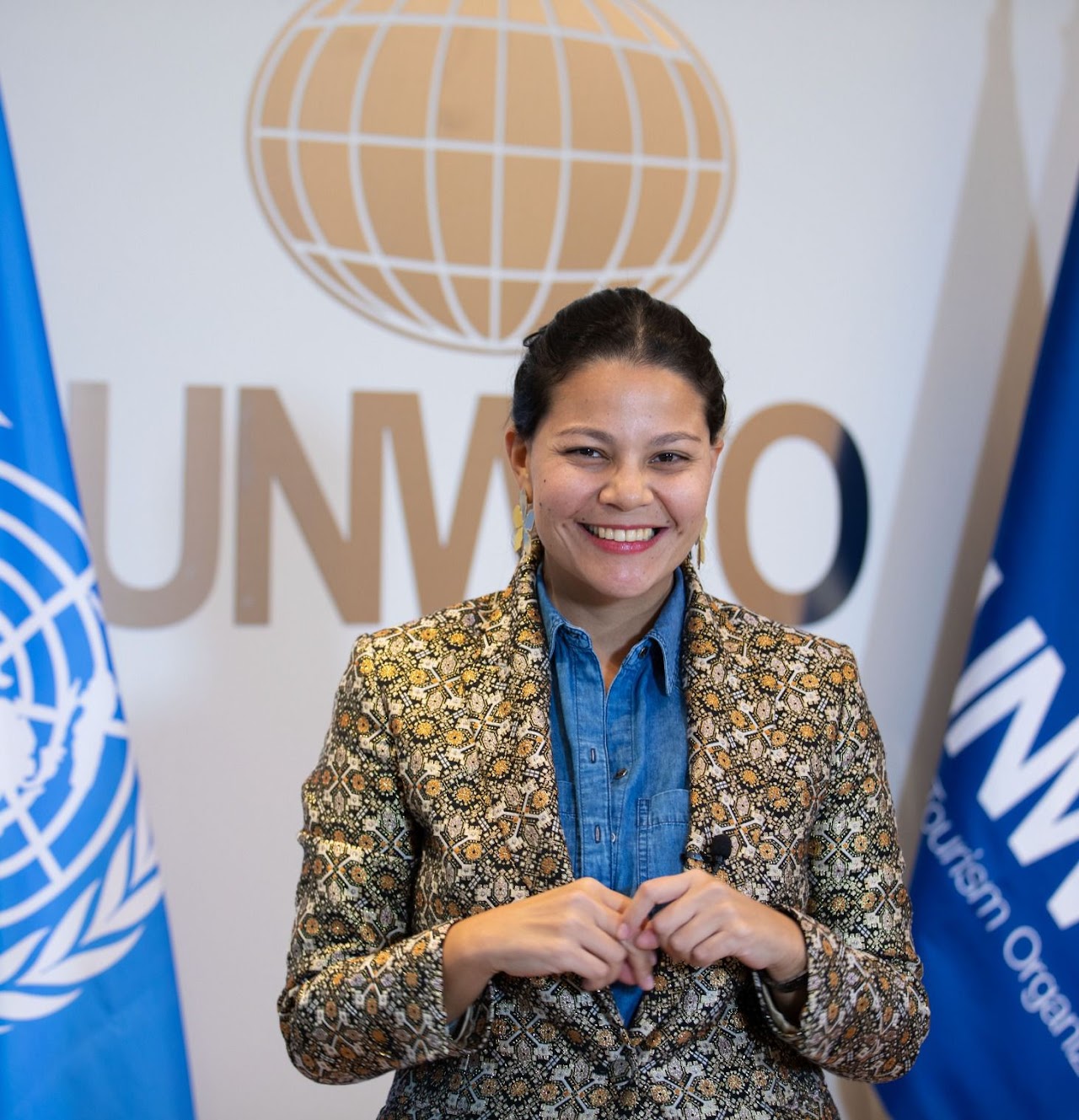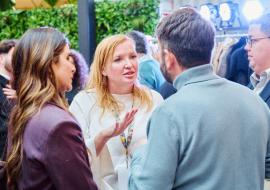Interview with Natalia Bayona

Dear Natalia Bayona, as a senior executive of the World Tourism Organization, how do you foresee the evolution of the tourism industry in the short and medium term?
According to the latest UNWTO World Tourism Barometer, international tourism experienced a 182% year-on-year increase in January-March 2022, with destinations worldwide receiving some 117 million international arrivals, up from 41 million in the first quarter of 2021. Of the additional 76 million international arrivals in the first three months, some 47 million were recorded in March, showing that the recovery is gaining momentum.
UNWTO data show that Europe and the Americas are leading the recovery. Europe, during the first quarter of 2022, welcomed almost four times more international arrivals (+280%) than in the first quarter of 2021 and in the Americas arrivals more than doubled (+117%) in the same three months.
It is worth noting that the Dominican Republic has performed outstandingly well during the pandemic and in 2021, the Dominican Republic's economy recovered and reached pre-COVID-19 economic growth. Some 38% of this recovery came from the tourism sector. According to figures from the Ministry of Tourism (MITUR), as of December 2021, the total employment recovery exceeded 300,000 jobs; being one of the first countries to reopen its borders. The growth exceeded the figures in 2021, generating a recovery rate of 73% of tourists compared to pre-pandemic figures in 2019.
We also applaud the results of the reactivation of tourism in Colombia, which in 2021 reached more than 2 million non-resident visitors with a growth of 52.1% compared to 2020, being an example in leading the recovery of the sector in the region. With a foreign exchange record of USD 3,101.9 million in the tourism sector in 2021, placing it as the first generator of foreign exchange among the non-traditional sectors.
What role do you think the World Tourism Organization has played in cushioning the impact of the pandemic on international tourism?. After the pandemic, do you think the World Tourism Organization is prepared for another health crisis like the one experienced with the coronavirus?
The UNWTO created a Global Crisis Committee for tourism to coordinate the actions of the public and private sectors, governments, international financial institutions and the United Nations. WHO and key representatives of the aviation and maritime sectors were also involved.
UNWTO's leadership in holding these general virtual meetings to assess and propose recommendations resulted in the creation of guides, publications and reports to reboot tourism with evidence-based decisions, guidelines and initiatives.
In addition, visits to Member States were resumed to provide recovery support, demonstrate solidarity and restart tourism in a more sustainable, inclusive and resilient manner.
Do you think that tourism destinations are making every effort to come up with creative and innovative solutions to position their businesses or destinations as appropriate?
The pandemic, digital transformation and new consumers have made tourism companies/destinations take a more creative and innovative turn when it comes to positioning and promotion.
We have learned that what is not communicated, does not exist, so the first lesson is that the clearest and most efficient vehicle for the promotion of a destination are digital platforms. During the pandemic we saw how museums gave guided tours through social platforms, how destinations showed their tourist attractions for when people could travel or even, in the case of the Canary Islands, offered themselves as a destination for teleworking. Clearly technology is here to stay and is becoming the fastest engine to accelerate economic growth. We must connect the traveller with an experience.
In addition, in our startup competitions we can see examples of how they have adapted to new technologies to create and personalise innovative tourism experiences. The startup that has delved into this is called My StreetBook, Spanish and winner of our Rural Tourism Spain competition. It is a tool that creates unique routes for tourists according to their tastes and preferences. Through artificial intelligence, big data and R&D, it incorporates static and dynamic content and reports on interactions at the destination, focusing on visitor satisfaction. Another example is the cultuAR project, a customised and free application based on Augmented Reality technology that offers dynamic and interactive content in real time, allowing the addition of digital information about tourist attractions in the locality.
What do you think are the key points at the moment in the relationship between public institutions and the tourism industry?
Incentives should be promoted for those who are working for a better and more sustainable tourism. The more incentives are given, the more entrepreneurs will get on board to work on the future of tourism, not only on the environment but also on social inclusion, working with communities, renewable energies, etc. Furthermore, of the 200 countries in the world, there are only 10 with modern laws and public policies on sustainable tourism, so work should also be done on this.
Do you consider that the pandemic has introduced relevant changes in the behaviour of tourists and travellers, or has everything remained relatively unchanged?
The pandemic has undoubtedly brought about changes in the way tourists and travellers travel and in their behaviour. During the pandemic, there was an increase in short trips and rural getaways, and travellers were looking for trips with truly unique experiences and a differentiating factor.
In addition, there was an increase in reaching tourist destinations through digital media. For example, Portugal was able to identify through a study that 80% of tourists going to the country went through digital media. Technology is here to stay and through it tourism can be developed and promoted.
What do you see as the main trends in international tourism?
The tourist destinations par excellence will continue to be there, but a new opportunity is opening up for these small, emerging, rural destinations, where they can survive not only through agriculture but also by linking agriculture to tourism, the development of rural tourism towards new experiences. In other words, new tourist destinations are being born. In global terms, national tourism is becoming very important, especially in emerging destinations, rural destinations, in destinations where we were not going.
On the other hand, mature destinations want to develop smart destination 2.0 strategies, i.e. they have already developed the basis of technology and how to make decisions through Big Data, but now they still have the task of improving the user experience.
As we have told other important players in the international tourism industry, there is a lot of talk about the digitalisation of the tourism industry and the answers are always different. In many respects, some think that the digitisation of the tourism industry is a catch phrase due to lack of knowledge, what is digitisation of the tourism industry for you?
Do you consider these terms to be known and internalised by tourism stakeholders?
COVID-19 has changed the way we think about tourism. While it was growing rapidly before the pandemic, supporting 10% of jobs worldwide and employing the largest number of women and young people, it has become even more important, as it is leading the global recovery thanks to its cross-cutting and resilient nature. Tourism has demonstrated its capacity to adapt and evolve. It is therefore impossible to think of tourism today without a clear picture of innovation and technology.
Innovation, technology and digitalisation will be key factors in rebuilding the travel, tourism and hospitality sector as the industry recovers from the impact of the COVID-19 pandemic.
The obligation is to develop more sustainable, more responsible, more innovative tourism where startups and entrepreneurs work more hand in hand with big business, modernise, help more information flow, help countries use Big Data or platforms/dashboards where they can read data, where they can project the carrying capacity of destinations, where they can see how to generate more micro-segmented marketing.
Finally, it is worth noting that more than 38% of the applied ventures are led or founded by a woman; in other words, when it comes to gender equality, technology and innovation are part of the solution to empower women, helping them to lead an economic sector with high added value. In other words, today technology is the most important vehicle for sustainable development.
What are the main objectives of the World Tourism Organisation in this area and what action is being taken?
If we want an innovative and modern sector, we need a professionalised sector. Before the pandemic it was a challenge, but after the pandemic, digital and online education is here to stay. That is why UNWTO created the UNWTO Tourism Online Academy, an online education academy where we collaborate with universities that have a vocation in tourism to upload high-level content to scale the way people educate themselves. Today, we have more than 15,000 students from 191 countries, among the top 5 countries of origin we find India, Spain, Qatar, Italy and Colombia. Top universities such as IE University, Sommet education and Swiss Education Group among others stand out with more than 20 MOOC and OCP courses in 3 languages.
In addition, together with Save the Children Dominican Republic we have promoted the first UNWTO education challenge that encourages the development of ideas and experiences of education through the tourism sector in Central America and the Caribbean: The Challenge for the Education of the Future, where you can join until 15 October.
How do you know the Tourism and Society Think Tank (TSTT) is a proposal born from the efforts of tourism industry actors, do you think we would have space and voice in such an important institution as the UNWTO?
UNWTO networks serve as a platform for active collaboration and UNWTO Member States and Affiliate Members can interact, share information and access important information. In addition, they can use the platform to generate, disseminate and apply expertise that will enable them to harness their full potential in addressing tourism-related issues of interest to various sectors. UNWTO's working groups are open to members wishing to exchange experiences on specific tourism segments.
UNWTO also promotes an open innovation model. The UNWTO Innovation Ecosystem aims to serve as a hub that fosters cutting-edge ideas and provides an enabling environment for determined entrepreneurs, risk-taking investors, leading sponsors and successful accelerators and accelerators.
Innovation is closely related to advances or improvements to what already exists, and your department works in an important way with tourism startups. Where can professionals working in this field approach your department?
They can contact us through our email iei@unwto.org or through our social media profiles @unwtoacademy.
What steps do you think we should take at the TSTT to become part of this great family that is the World Tourism Organization?
The UNWTO has an Affiliate Members department which is the main gateway to partnerships and collaborations between the public and private sectors in tourism. After filling in the application form and being verified internally, you will be able to access networks, interactive platforms, reports and publications among others.
In your opinion, what are the main changes and developments that the international tourism industry will experience in the coming years?
In my opinion we should work on the future of tourism through five key points: innovation, developing new tourism experiences, entrepreneurship and making strategies to promote and scale. The third point is investment in education, i.e. promoting careers in tourism that people want to study and that have high added value so that they can employ millions of people with salaries that are decent and sustainable over time. Sustainability, not only mitigating the impact on the environment but also promoting incentives for those who are working for a better future and finally, investments. Public and modern investments in sustainable tourism that incentivise these kinds of issues.














